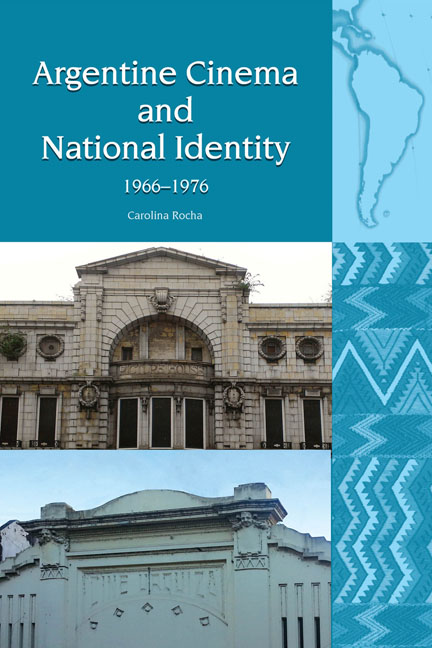Book contents
- Frontmatter
- In Memory of Paulina Piselli (1937–2017)
- Contents
- Acknowledgements
- Introduction
- Section I Argentine History and National Cinema, 1955–1976
- Section II The Cinematic Gauchesque
- Section III Representing Founding Fathers
- 10 Looking for a National Hero
- 11 Güemes, la tierra en armas
- 12 Bajo el signo de la patria
- 13 Juan Manuel de Rosas
- Conclusion
- Bibliography
- Index
12 - Bajo el signo de la patria
from Section III - Representing Founding Fathers
- Frontmatter
- In Memory of Paulina Piselli (1937–2017)
- Contents
- Acknowledgements
- Introduction
- Section I Argentine History and National Cinema, 1955–1976
- Section II The Cinematic Gauchesque
- Section III Representing Founding Fathers
- 10 Looking for a National Hero
- 11 Güemes, la tierra en armas
- 12 Bajo el signo de la patria
- 13 Juan Manuel de Rosas
- Conclusion
- Bibliography
- Index
Summary
The success of Torre Nilsson's historical films inspired other filmmakers to tackle the depiction of key Argentine figures. In the late 1960s, actordirector René Múgica (1909–1998) was approached by retired general Alberto Lorenzo, a liaison of Brigadier González Filgueiras, chairman of the Instituto Nacional Belgraniano [National Belgranian Institute] (INB). González Filgueiras wanted to make a film to celebrate the bicentennial of Manuel Belgrano's birth but time restraints meant that it was not possible. Nonetheless, Múgica continued with the project of making a film of the founding father's life. Manuel Belgrano (1770–1820) was an economist, lawyer, leader in the war of independence, and the designer the Argentine flag. In an article from June 1971, five Argentine historians offered positive views of him. Ernesto Fitte, winner of the National Award of History in 1967, characterized Belgrano as ‘uno de los personajes más limpios de nuestra historia’ [one of the most spotless characters in our history] (Sainz German, 1971, 80). Historian Félix Luna (1925–2009) concurred: ‘Buena imagen la de Belgrano. Nadie ha hablado mal de Belgrano; se le habrán criticado algunas decisiones, algunas actitudes, pero nunca se lo enjuició negativamente’ [Belgrano's image is good. Nobody has talked badly of Belgrano; some of his decisions and attitudes may have been criticized, but nobody ever has judged him negatively] (Saenz Germain, 1971, 81). A well-respected patriot in the Argentine independence process, Belgrano took part in military campaigns in Paraguay and in northern Argentina, spreading revolutionary ideas against Spanish domination.
Belgrano experienced setbacks in his first armed campaigns. Historian Enrique de Gandía (1906–2000), the first president of the INB, mentioned that Belgrano was aware of his limitations when he wrote to a friend: ‘¿A qué nos hemos de engañar? ¿De dónde ni cómo había de ser yo un general?’ [Why deceive ourselves? Where and how was I to be a general?] (Saenz German, 1971, 80). Belgrano's vulnerability and frankness were precisely the traits that Múgica considered most appealing about the founding father: ‘siempre me fascinó ese general resistido por sus compañeros, frágil de salud, pero capaz de encabezar una carga y derrotar, a puro coraje, ejércitos más numerosos y disciplinados que el suyo’ [he always fascinated me, this general who was resisted by his fellowmen, in fragile health, but able to lead a charge and vanquish, with courage alone, armies with more men and discipline than his own] (Giménez Zapiola, 1971, 44).
- Type
- Chapter
- Information
- Argentine Cinema and National Identity (1966–1976) , pp. 180 - 197Publisher: Liverpool University PressPrint publication year: 2018



